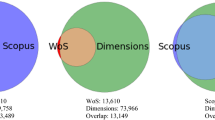Abstract
Writing academic books is one of the core expressions of academic research. In the process of writing, the author cites many types of publications such as journals, journal articles, reports, web sources and books. Collecting and analyzing these citations in selected academic books, leads to the creation of book citation indexes. Based on this concept and design, the Chinese book citation index (CBkCI) is produced. The value of the CBkCI lies not only in filling the domestic vacuum in book citation, but also in promoting the quality of academic book publishing, and in contributing to a better library collection development. More importantly it helps to lay a solid foundation in the area of academic evaluation.
Similar content being viewed by others
References
Adam, J., Testa, J. (2011). Thomson Reuters Book Citation Index. In E. Noyons P. Ngulube & J. Leta (Eds.), Proceedings of the ISSI 2011 Conference, (pp. 13–18). Durban: ISSI, Leiden University and University of Zululand.
Garfield, E. (1987). ISI’s Index to Scientific Book Contents: Cataloging composite books chapter by chapter. Current Contents, (February 9, 1987), pp. 3–8.
Gorraiz, J., Purnell, P. J., Glänzel, W. (2013). Opportunities for and limitations of the book citation index. Journal of the American Society for Information Science and Technology, 64(7), 1388–1398. Thomson reuters. Book Citation Index [2012-04-18]. Available at: http://ip-science.thomsonreuters.com.cn/media/BkCI_fs_CN-18Apr12.pdf.
Jin, B. H., & Wang, B. (1999). Chinese science citation database: Its construction and application. Scientometrics, 45, 325–332.
Jin, B. H., Zhang, J., Chen, D., & Zhu, X. (2002). Development of the chinese scientometric indicators (CSI). Scientometrics, 54, 145–154.
Rousseau, R., Van Assche, J., Vanderborght, P. (2012). Serials of proceedings: Acta Horticulturae and the field of horticulture. In H-N. Choi, H-S. Kim, K-R. Noh, S-H. Lee, H-J. Kang & H. Kretschmer (Eds.), Proceedings of the 8 th International Conference on Webometrics, Informetrics and Scientometrics (WIS) & 13 th Collnet Meeting, (pp.119-127). Seoul: Korea Institute of Science and Technology Information.
Su, X. N., Han, X. M., & Han, X. N. (2001). Developing the Chinese social science citation index. Online Information Review, 25(6), 365–369.
Verleysen, F. T., & Engels, T. C. E. (2013). A label for peer-reviewed books. Journal of the American Society for Information Science and Technology, 64(2), 428–430.
Wang, LJ. (2012). Research on Book Evaluation in Humanities and Social Sciences based on an Innovation Measure. Doctoral dissertation Nanjing University (in Chinese).
Wu, Y., Pan, Y., Zhang, Y., Ma, Z., Pang, J., Guo, H., et al. (2004). China scientific and technical papers and citations (CSTPC): History, impact and outlook. Scientometrics, 60(3), 385–397.
Yang, Y. S. (2004). A noteworthy phenomenon of academic collections. Journal of Yunmeng, 4, 29–30.
Ye, JY. (2010a). Why academic evaluation is necessary and conceivable. Guangming Daily, August 3, 2010.
Ye, JY. (2010b). Approaching evaluation system in humanities and social sciences. Journal of Nanjing University (Philosophy, Humanities and Social Sciences), 1, 97–110.
Ye, JY. (2011). All-around evaluation system and its application base on quality and innovation measurement. Guangming Daily, November 25, 2011.
Ye, JY. (2012). To build and perfect a philosophy and social science evaluation system based on quality and innovation. [2012-02-10], National philosophy social science planning office. Available at: http://www.npopss-cn.gov.cn/GB/219468/17082632.html.
Ye, JY., Wei, R. B., & Song, G. (2006). Investigation and analysis about Chinese humanities & social science academic collections. China Publishing Journal, 10, 17–21.
Acknowledgments
The author thanks the following members of his research group: Yuan Peiguo, Wu Xiangdong, Zheng Dejun, Yuan Xilin, Wang Lanjing and Zhou Pei. He further thanks Ronald Rousseau for helpful discussions and linguistic corrections. Anonymous reviewers are thanked for many suggestions to clarify the contents of this submission. The author also thanks for support through the National Social Science Foundation grant no. 04&ZD031; and The Ministry of Education of humanities and social science research project (Research integrity and construction of style of study), grant no. 11DXF001.
Author information
Authors and Affiliations
Corresponding author
Rights and permissions
About this article
Cite this article
Ye, J. Development, significance and background information about the “Chinese Book Citation Index” (CBkCI) demonstration database. Scientometrics 98, 557–564 (2014). https://doi.org/10.1007/s11192-013-1092-7
Received:
Published:
Issue Date:
DOI: https://doi.org/10.1007/s11192-013-1092-7




